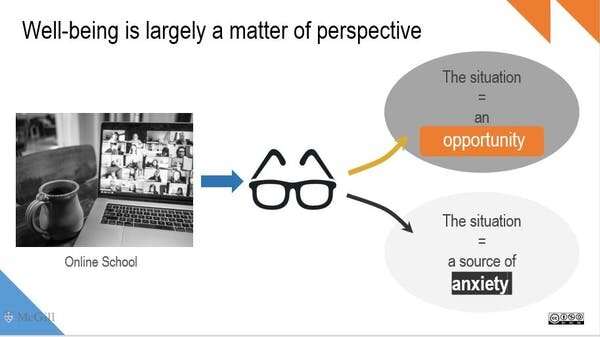
The COVID-19 pandemic has undoubtedly affected us. It has increased our worries and concerns about physical health. COVID-19 has added to the existing challenges parents face, and has also created greater awareness surrounding the fragility of mental health.
Yet, the second wave has also paved the way for a larger discussion on ways to promote mental well-being.
As a researcher and a clinical psychologist, I lead a research group that investigates how emotion regulation, values and beliefs affect the development and inter-generational transmission of mental or behavioral disorders, and how these problems can impact educational achievement.
The Childhood Anxiety and Regulation of Emotions (C.A.R.E.) research group has developed a school-based program as well as a parenting program, both of which teach core coping skills that have been associated with resilience. Resilience is the capacity for an individual to remain engaged, available and optimistic instead of withdrawn, overwhelmed and defeated when faced with hardship and adversity.
Our research group believes that when parents are aware of their own emotional self-regulation, and when they can find space to structure meaningful family activities that promote mutual bonding, both they and their children are in a better position to learn core coping skills that will benefit individuals and family relationships.
Impact of the pandemic on family life
A recent report by the Australian Human Rights Commission investigated COVID-19-related concerns experienced by children aged five and older and emerging adults from January to April 2020. The report suggested that “mental health concerns resulting from COVID-19” and “impacts on family life” were among the top five concerns endorsed by youth.
Similarly, a July 2020 Statistics Canada report revealed three out of four parents experienced concerns and worries about balancing child care, their child’s schooling and their own professional work irrespective of the child’s age. More than half of parents surveyed reported greater difficulty managing their child’s emotions as well as their own.
The arising parenting challenges surrounding the COVID-19 pandemic may represent an opportune time for us to improve our resilience and model more adaptive strategies and skills. In turn, such skills can promote the development of resilient behaviors in our children.
As the picture below illustrates, not everyone reacts in the same way to a given situation. The ability to manage strong negative emotions and shift our mindset to a more adaptive perspective can be developed at any age. Since our brain is most adept at performing a new task early in life, it’s most beneficial for people to become socialized in these fundamental life skills early. This will help children to become self-regulated, adaptive and thriving adults.
Parental emotions
Findings from our research group’s recent study, conducted with mothers, suggest that parents’ abilities to regulate their own emotions predicted how frequently and effectively they rely on supportive parenting practices. Supportive practices are things like comforting children when they experience negative emotions; engaging in problem-solving strategies aimed at reducing children’s distress; and discussing children’s emotional experiences with them. As such, these results suggest that supportive parenting is associated with children who are better at managing difficult emotions.

We also found that invalidating children’s emotional expression or ignoring or dismissing the child’s emotions contributed to poorer emotion regulation skills in children, and that such less-supportive parenting practices were linked to anxiety in adulthood. When parents themselves match or exceed their child’s emotions, they also offer less adaptive emotional coaching.
Parents may have heard the airplane safety tip to always don one’s own oxygen mask before helping a child: the same applies with emotional regulation. As parents, when we prioritize managing our own stress, tolerating greater uncertainty and engaging in self-care activities like exercise, good sleep hygiene and relaxation, this expands our capacity to respond calmly. This teaches our children that they too can cope and manage stress and related threats.
Supportive parenting is best achieved when a connected, caring and responsive relationship with children is fostered early on. Supportive parenting that builds resilience is comparable to an early investment that grows with time. It is key to create as many early positive and reinforcing experiences as possible.
Failure: An opportunity for growth
Parenting is difficult and striving for perfection is unrealistic and unattainable. We can instead chose to model that mistakes and failures can be a renewed opportunity for growth. Raising resilient children means that we value teaching them self-compassion, gratitude, delayed gratification and self worth to leverage life experiences that facilitate the development of their sense of purpose.
It is as critical for parents to value teaching children these core social emotional skills, just as much as we might encourage them to become expert swimmers or gifted mathematicians.
When supportive parenting and strong family relationships consistently provide opportunities to strengthen coping skills and the ability to regulate emotions, these are also opportunities for children to become skilled at accepting hardship and remaining committed toward achievement. Supportive parental practices contribute to children’s long-term healthy emotional and psychological development.
Parents can help their children develop these key social-emotional abilities in a variety of ways.
Source: Read Full Article


